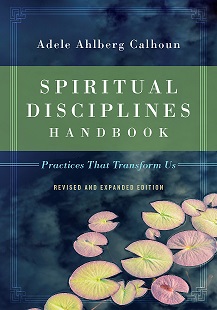
What kind of spiritual discipline is rest?
What exhausts you? introduced an exploration of the spiritual discipline of rest, one which I find particularly pertinent not only to my life, but also to the lives of those whom I interact with on campus — in campus ministry and as a seminary student. As you may remember, the inspiration for the first post was a discussion I facilitated for a mix graduate students and medical students who are part of the Christian Medical Society / CMDA at Penn State College of Medicine. In preparation for the gathering, I drew from Adele Ahlberg Calhoun‘s Spiritual Disciplines Handbook: Practices That Transform Us (InterVarsity Press, 2005; revised/updated 2016). Let’s take a look at an excerpt from Calhoun’s Introduction, subtitled Discovering Your Desire, to learn how she approaches the spiritual disciplines.
Spiritual disciplines give the Holy Spirit space to brood over our souls. Just as the Spirit hovered over the face of the deep at the dawn of creation, so he hovers over us today, birthing the ever-fresh Christ-life within. The Christ-in-me identity is not bound to a generic one-size-fits-all program for union with God. The Holy Spirit knows the spiritual practices, relationships and experiences that best suit our unique communion with God. He knows how to help us move into the “unforced rhythms of grace” that Jesus offers to teach us (2005, 19). . . .
Disciplines are intentional ways we open space in our lives for the worship of God. They are not harsh but grace-filled ways of responding to the presence of Christ with our bodies. Worship happens in our bodies, not just our heads. Paul writes in Romans 12:1, “Offer your bodies as living sacrifices, holy and pleasing to God — this your spiritual act of worship.”
Offering our bodies to God lands us smack in the middle of our weaknesses and limits. We don’t have unlimited energy, time and personal resources. We are finite. We need to be realistic about what our body can do and sustain. Burning the candle at both ends can burn out the soul as well as the body. Spiritual disciplines are ways we give our bodies to unhurried rhythms of grace. They are ways we un-hurry our souls before God. It is important to remember that we are not meant to do all the practices at once (2005, 20).
It’s hard not see rhythm and rest weaving their way into Calhoun’s understanding of spiritual disciplines in general. Please consider this a teaser, there is much more to read in Calhoun’s description of following desires and desperations to disciplines through the helpful acronym of WORSHIP.
In her section on rest, Calhoun articulates the desire met by rest as “to honor God and my human limitations through restful rhythms” (63). She defines the spiritual discipline of rest as:
Entering into rest depends on honoring our God-given limits. By paying attention to the physical, mental and spiritual needs of the body, we learn when and how to rest (2005, 63).
Reflection Questions
In addition to What exhausts you or keeps you working past your limits? Calhoun asks
- When and where do you most deeply rest? Who helps you rest?
- What is it like for you to set aside time to play? How regular and inviolable is that time? (2005, 65)
As it is summer, I offer these questions to you and encourage you to explore them personally, with friends part of the communities of faith with which you are connected (even this blog). Maybe it is a season when you have opportunity to develop patterns/habits/rhythms (and accountability for them) which will carry over to the fall term. Calhoun closes her section on rest by offering several Spiritual Exercises including . . .
Consider whether or not your tiredness is about body or soul.
- What kind of rest would refresh your body: exercise, a nap, going to bed early?
- What kind of rest would refresh your soul: retreat, sleep, music, reading, centering prayer?
- Choose two times this week when you will intentionally enter into rest for body and soul.
“My soul finds rest in God alone.” — Psalm 62:1
Updated: 7/10/2017, 1:50 pm
Tom enjoys daily conversations regarding living out the Biblical Story with his wife Theresa and their four girls, around the block, at Elizabethtown Brethren in Christ Church (where he teaches adult electives and co-leads a small group), among healthcare professionals as the Northeast Regional Director for the Christian Medical & Dental Associations (CMDA), and in higher ed as a volunteer with the Emerging Scholars Network (ESN). For a number of years, the Christian Medical Society / CMDA at Penn State College of Medicine was the hub of his ministry with CMDA. Note: Tom served with InterVarsity Christian Fellowship / USA for 20+ years, including 6+ years as the Associate Director of ESN. He has written for the ESN blog from its launch in August 2008. He has studied Biology (B.S.), Higher Education (M.A.), Spiritual Direction (Certificate), Spiritual Formation (M.A.R.), Ministry to Emerging Generations (D.Min.). To God be the glory!

Leave a Reply